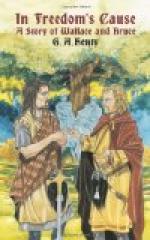“Treason! treason! to arms!” An instant stir was heard in the castle. Rapidly the thirty men followed each other up the ladder, and so soon as the last had gained the battlements they divided in three bodies, each headed by one of the leaders. One party descended straight into the castle and there attacked the soldiers who were hurrying to arms, while the others ran along the wall in opposite directions, cutting down the sentries and brushing aside all opposition until together they met at the gate. This was thrown open, and the Scots outside running up at the top of their speed poured into the castle. At first Randolph’s party, which had descended into the courtyard, had been hotly pressed, and had with difficulty defended themselves; but the attention of the startled garrison was distracted by the shouts upon the walls, which told that other parties of their assailants had gained footing there. All sorts of contradictory orders were issued. One commanded them to cut down the little party opposed to them, another ordered them to hurry to the walls, a third to seize the gate and see that it was not opened. The confusion reached its height as the Scots poured in through the open gate. The garrison, surprised and confounded as they were at this, to them, almost magical seizure of the castle by their foes, fought bravely until the governor and many of the officers were killed. Some of the men threw down their arms, and others, taking advantage of their knowledge of the castle, made their way to the gate and escaped into the open country.
The news of the capture was immediately sent to the king, by whose orders the castle and walls were razed to the ground, and thus another of the strongholds, by whose possession the English were enabled to domineer over the whole of the surrounding country, was destroyed.
While Douglas and Randolph were thus distinguishing themselves Edward Bruce captured the castle of Rutherglen, and afterwards the town of Dundee; and now, save Stirling Castle, scarcely a hold in all Scotland remained in English hands. Thus was Scotland almost cleared of the invader, not by the efforts of the people at large, but by a series of the most daring and hazardous adventures by the king himself and three or four of his knights, aided only by their personal retainers. For nine years they had continued their career unchecked, capturing castle by castle and town by town, defeating such small bodies of troops as took the field against them, England, under a supine and inactive king, giving itself up to private broils and quarrels, while Scotland was being torn piecemeal from her grasp.
After Edward Bruce had captured Dundee he laid siege to Stirling. As this castle had for many months resisted Edward I backed by the whole power of England, Bruce could make little impression upon it with the limited appliances at his disposal. From February till the 24th of June the investment continued, when the governor, Sir Philip Mowbray, becoming apprehensive that his provisions would not much longer hold out, induced Edward Bruce to agree to raise the siege on condition that if by the 24th of June next, 1314, the castle was not effectually relieved by an English force, it should then be surrendered.




